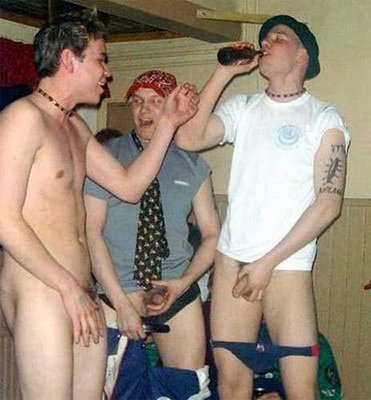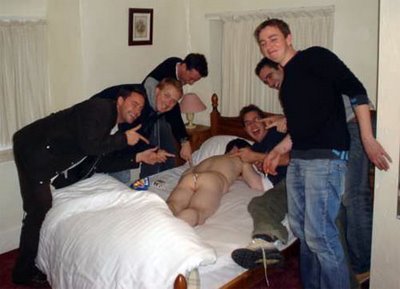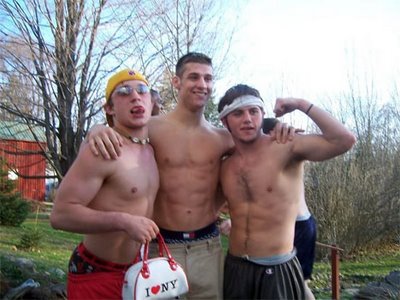Boys will be Boys

Out, but not yet in the clear
Despite progress, gay community faces prejudice
Riley Bauling
In the trunk of UNM student Matt Kenney's car is an aluminum bat with a strip of cloth wrapped around the handle.
It's there at his parents' request.
Kenney, a gay man, won't get rid of the bat, because he has heard about gay bashings too often to risk driving around without it.
"I've never had to use it, but there's always that 'what if?'" he said. "I don't want to be one of those one-in-10,000, or one-in-a-million chances, but that also means that I'm not going to go crawl under a rock."
Kenney hasn't caught any flak on campus for being openly gay. UNM hasn't been anything like Valley High School, where his openness about his sexuality got him relentlessly teased and called a "weirdo."
Kate Thompson, a lesbian and the president of the University's Queer Straight Alliance, said gay people's treatment on campus is still a work in progress. Needing a support group on campus like the QSA shows just how much more progress has to be made, she said.
"Maybe one day we'll be a part of everyday society, where we don't have to have an office in the corner (of the SUB); where we don't have to have a student organization," she said. "It'd be nice to not be viewed as a minority or as a group that is prejudiced against. We should just be part of something bigger, but we're not. We're secluded."
The worst Thompson has dealt with is the awkward stares from passersby when she's kissing a woman or the word "lesbian" shouted out of vehicles while she's holding her girlfriend's hand. That's usually all lesbians have to cope with, she said.
Thompson's not afraid of being confronted because of her sexual orientation anymore, and it didn't take her long to get to that point, she said.
It's gay men that aren't so lucky. Cases like Matthew Shepard's, the gay student from the University of Wyoming who was beaten to death and tied to a fence in Laramie, Wyo., in 1998, make it difficult for them to be open or come out at all, Kenney said.
And that fear of what could happen takes a while to drift away, he said.
Students David Gonzalez and David Martinez aren't afraid, but they are always aware of what's going on around them.
They have no problem kissing on campus, holding hands or lying together in the grass by the Duck Pond, but the couple is still growing accustomed to the double-takes and gaping mouths that have come during the month the two have been together.
"You never know what people are going to think when they see us," Gonzalez said. "It's just a fear of not knowing what they might do. It's a different way to live, and it's something you have to adapt to."
Getting used to the stares that provoke the fear is a struggle, said student Aaron Aguilar, a bisexual man.
Between the dresses he wears from time to time, the assorted colors he dyes his hair and the tattoo of an anarchy symbol inside a heart on his left shoulder, he expects those weird looks now.
"I get a lot of those. I've had people scream out of their car windows at me. I've been riding my bike and had a Coke thrown at me. If you appear to be queer, and you're out," he said, "it's dangerous."
Until that danger subsides, Kenney said he'll continue to go out in large groups.
"It is frustrating, because you always have to keep in the back of your mind who is around you," he said. "There are things we're trying to do to change that. There's safety in numbers. If there's a big group of people that go somewhere, and boys are holding hands with boys, that makes it a lot easier. That's also a tactic for getting the thought out there that we are here, and we're not going away."
While there's strength in numbers for Kenney, there's strength in knowing which places are gay-friendly and safe for student and lesbian Becky Vogsland, his roommate.
Flying Star is one of her favorite hangouts, but she has to keep in mind the time of day she goes.
Families in the morning equal awkward stares for her and her date.
Younger patrons at night mean she doesn't have to hide anything.
"I don't go to Flying Star in the daytime, when there would be families there or people that would have a problem with it," she said. "It is something that I think about, but not always on a conscious level. I go to the places that I like, but if I sit and think about why I like them, it's because I feel safer there."
Vogsland, who ran for homecoming queen and is the vice president of QSA, is glad to be back in Albuquerque, though. Even if it might not be safe all the time for someone who is gay, it's no St. Louis. She attended St. Louis University, a Catholic school, and whispers followed her like a tail wherever she went - "There's the lesbian," "There's that weirdo," "Let's get away from her."
She transferred to UNM in the fall of 2005. She spent a year at St. Louis University dating the only other open lesbian on campus. It was a year of not showing affection in public.
Now that she's here, she can kiss a woman outside of the SUB or hold hands walking through Dane Smith Hall without worrying about what people might say.
The whispering is gone, but it's her classmates' actions at UNM that make her grind her teeth in frustration.
"I have classes with a bunch of straight men who are just like, 'Oh, you're sick.' And there's girls who won't sit anywhere near me because they're like, 'Oh, gay girl. She's obviously going to hit on me,'" she said. "Just because I like girls doesn't mean that I like every girl."
Aguilar gets frustrated in class, too. There was the time last year when he called his choral director out for saying that the bass section was singing like a bunch of "pansies."
That and the all-too-casual usage of "gay" to imply that someone or something is stupid or inferior make Aguilar bristle.
"That is implying that homosexuality is bad, and you're degrading people that way," he said. "It's just like saying, 'That's Jewish.' These things have a way of creeping into our collective conscience, and if you are perpetuating that, then we are never going to make it to a place where we're equal."
And making it to that place is a tug-of-war that should end soon, Gonzalez said.
"I don't think what I'm asking for is unreasonable, just equality," he said. "It's not a horrible thing to ask for - for anybody."















No comments:
Post a Comment